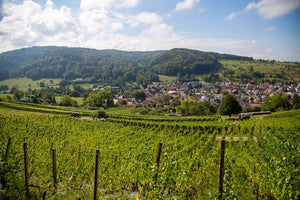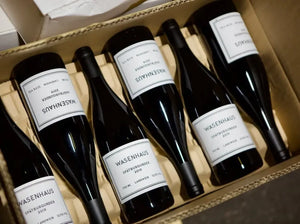Blog » Baden
-
Baden Benchmark: Enderle & MollSven Enderle and Florian Moll are lucky to farm some of the oldest Pinot Noir in Baden. If there's one under-the-radar Pinot Noir outside Burgundy, still with the same sensibilities and an added natural flair, it's this duo from Germany. Their exacting approach in the vineyard and cellar allows minimal sulfur additions, highlighting the vivid purity of their Pinot Noirs. Neutral barrels for aging come from Domaine Dujac of Morey Saint Denis lore.Liaison, planted in 1970, is spicy, mineral-driven, and ethereal yet saturates the palate—the perfect intro to Enderle & Moll's singular style.Buntsandstein is 1954-planted and shows deeper layers with expansive texture. Powerful yet refined with a long finish.Muschelkalk, sourced from 80-year-old vines on pure limestone soil, is lighter with more tension and chalky minerality.After working across the globe, Enderle and Moll returned home in 2007 with a clear mission: To work in Baden using organic and biodynamic viticulture. The natural wine crowd and critics alike have championed these wines upon their relatively recent release in the U.S. Most notably, Jancis Robinson went as far as to place them in the "cult" category.
-
Anything but Ordinaire: Wasenhaus Spatburgunder
The hunt for German Pinot Noir producers who get it is a never-ending pursuit. Much of the point-chasing efforts from estates in Baden (Pinot Noir territory) are overly masked through excessive oak, extraction, and out-of-whack ripeness seemingly intended to elicit oohs and ahs from tasters as if they had finally made that Burgundy-beater. Any German producer intent on outshowing Burgundy would be better suited in another line of work.
Today's afternoon offer is exciting for a couple of different reasons. First, Alexander Götze and Christoph Wolber have spent over a decade working at Burgundian domaines like Leflaive, De Montille, Pierre Morey, and Comte Armand. Secondly, I have fond memories of spending time with Alex during my year-long stint in Beaune. His goal was always to return to Germany and produce Pinot Noir that followed the sensibilities that the Côte d'Or naturally transmitted.
Wasenhaus is Pinot Noir at its most ethereal. For me, the entry-level bottling, Grand Ordinaire, is the highlight of the lineup. The delicacy and levity here brought an up-front drinkability and ease that's undeniably delicious and equally brilliant. No doubt, the duo's experience in Burgundy imparted an important lesson: That great wine is made in the vineyard and raised with a soft touch in the cellar.
Much of the elegance in the Wasenhaus range can be attributed to working with vineyards with a higher content of limestone and sand versus the heavier clay soils that are more common throughout Baden. As you can imagine, those with an eye toward grace above power will choose their sites wisely.
The Spätburgunder ferments with 90% destemmed fruit and 10% whole clusters. Aging takes place in neutral barrel for one year, followed by six months in stainless steel. This switch really benefits the wine as it holds in those more crunchy and bright red berry fruit characteristics. The lingering finish with sweet brown spices and savory tones is persistent, especially given the humble price point.
I'm always up for tasting German Pinot Noir, but I rarely find wines that pull me in like red Burgundy. For Wasenhaus, it's the effortless sensibility and focus on terroir that shines the brightest.
.svg?v=162776257677185172071724397232)




